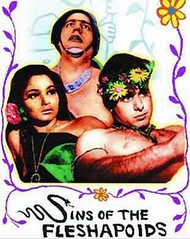 Rich recently posted about Brokeback Mountain--the film that all we 'mos have been talkin' about for over a year. He stated that he thought the halls of queer cinema are dilapadated. He later went on to correct himself by saying that good queer films are few and far between.
Rich recently posted about Brokeback Mountain--the film that all we 'mos have been talkin' about for over a year. He stated that he thought the halls of queer cinema are dilapadated. He later went on to correct himself by saying that good queer films are few and far between.For every Brokeback [Mountain] or [Far From] Heaven, there are a couple dozen Tricks, he wrote.
I would just like to posit that good films in general are few and far between. Films like Trick are certainly part of the logical progression of queer film, and their inocuosness should neither be derided nor praised. So, over the next few weeks, probably starting after the New Year, I plan on writing about the films that I believe make up the canon of queer cinema. I'm going to try and analyze the film on its own, contextualize it, and open it up for discussion. So I'd really like to
see your comments, m'kay?
That's why I'm giving you a chance to see the film before I canonize it, ok? Maybe we'll throw a few out. Maybe we'll add a couple.
<#queer>First of all, I think we should define queer politik/aesthetic. From his 1993 book Fear of a Queer Planet, Michael Warner writes, "Every person who comes to a queer self-understanding knows that her stigmatization is connected with gender, the family, notions of individual freedom, the state, public speech, consumption and desire, nature and culture, maturation, reproductive politics, racial and national fantasy, class identity, truth and trust, censorship, intimate life and social display, terror and violence, health care, and deep cultural norms about the bearing of the body." I like that reading. Its broad, yet specific. If you have another to add, or a completely different reading, let me know.
So, for our first film, we're going to see the new-to-DVD 60's American Underground classic, Sins of the Fleshapoids by George and Mike Kuchar. And we might include The Secret of Wendel Samson (which is also on that disc and features a performance by Red Grooms). George and Mike Kuchar were the original underground filmmakers. They made their films cheaply and showed them for whoever would watch them. Sins of the Fleshapoids is often considered, along with The Chelsea Girls (Warhol/Morrissey) and Scorpio Rising (Anger), a seminal work of 60's Underground cinema. Now we, dear readers, are going to see if it is worthy of canonization into the annals (hehe) of queer cinema.
So if you've got a Netflix account, put it in your queue. Otherwise, hit up your local video store and get ready for some discussion.
Oh, and if you want to read up on George and Mike, here's a great article.
(And I swear I'll get that mix to you before Xmas!)







2 comments:
I look forward to the production of this canon. I will try to rent this movie so that I can provide my input for you.
cool! thanks adam!
Post a Comment